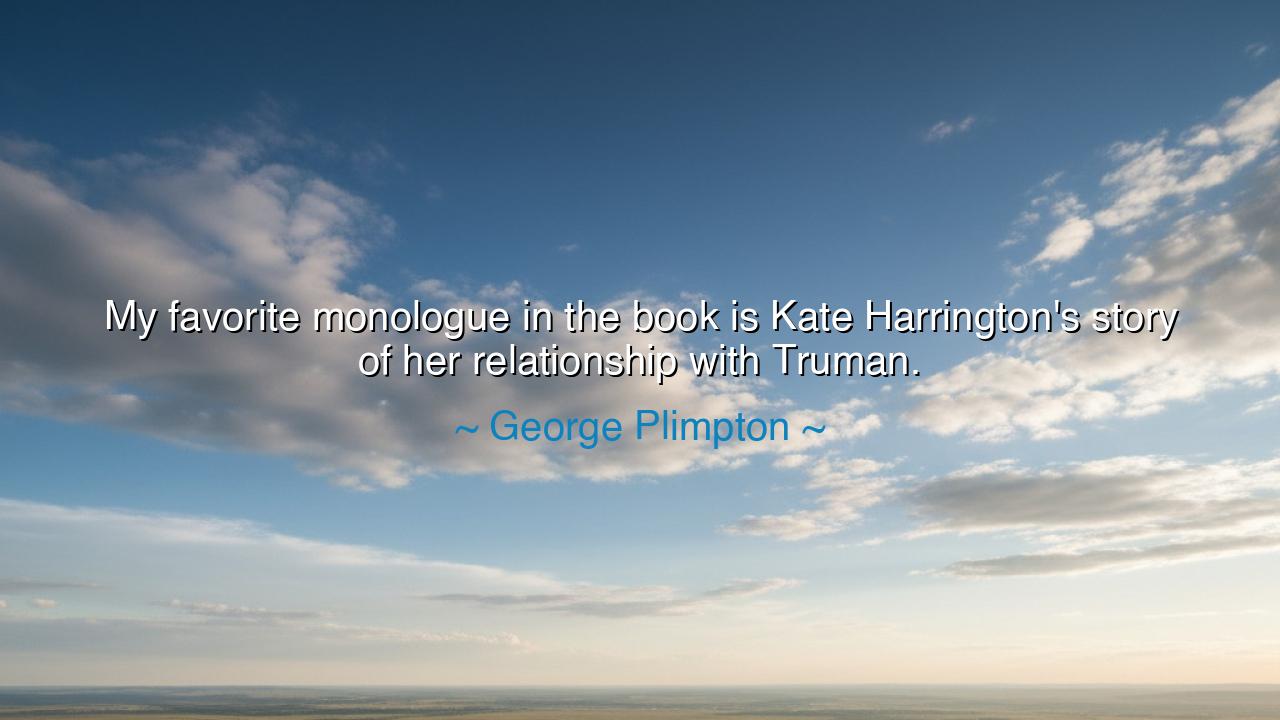
My favorite monologue in the book is Kate Harrington's story of
My favorite monologue in the book is Kate Harrington's story of her relationship with Truman.






The words of George Plimpton, “My favorite monologue in the book is Kate Harrington’s story of her relationship with Truman,” carry the fragrance of reverence for story and memory. In them, we are reminded that the power of a tale does not lie in its length, but in the depth of its truth. A monologue, when sincere, becomes more than a speech—it is a window into the heart, where one soul dares to reveal its bond with another.
At the center of this reflection is the relationship between Kate Harrington and Truman. Their story, preserved in words, transcends the mere details of life and enters the realm of legacy. For when one speaks of another with honesty, affection, or sorrow, they keep alive not only the person but the thread of connection that unites past and present. Thus, Plimpton’s choice of this tale as his favorite is a testament to the enduring power of human bonds set into narrative.
The origin of this saying lies in Plimpton’s work as a chronicler of lives, a lover of voices, and a seeker of truth within the stories of others. In honoring Kate Harrington’s monologue, he honors also the craft of storytelling itself: that a single voice can carry across time, bearing with it both the burden and the beauty of relationship. It is not the grandeur of events, but the honesty of expression, that moves the soul.
Let the generations remember: words are vessels, and within them live the spirits of those who came before. A book is more than paper; it is a sacred house where voices dwell. A monologue is not a solitary utterance, but a communion between speaker and listener. And a relationship, once spoken of with truth, becomes eternal. Thus, George Plimpton’s words remind us to cherish the stories that bind us, for in them lies the wisdom of both love and remembrance.






TANguyen Thac Truc Anh
I’m curious about why George Plimpton considers Kate Harrington’s monologue his favorite. What aspects of her relationship with Truman are revealed through her perspective that make it so powerful? Perhaps it’s a deeply emotional or revealing moment in the book. I wonder how this monologue adds depth to both Truman's character and the overall narrative. Does it shift the reader's perception of their relationship or provide new insights into their dynamic?
THTran Hoang
It’s interesting that George Plimpton picks Kate Harrington’s monologue as his favorite. It makes me wonder what makes this moment so impactful in the story. Is it the raw emotion, the personal perspective, or something else about their relationship that makes it stand out? I’d love to hear others' thoughts—what makes this monologue resonate with you, and why do you think it’s the one Plimpton remembers most?
TTChu Thi Thuy
I can see why George Plimpton would mention Kate Harrington's story as his favorite. Relationships often reveal so much about human nature, and Truman’s relationship with Kate must have a unique complexity. What does this monologue tell us about Truman that we might not see elsewhere in the book? I wonder how much of Kate’s perspective on their relationship differs from other characters’ views. Does it shift the way we understand Truman?
HVHuy Vu
This quote makes me curious about the relationship between Kate Harrington and Truman. Why does George Plimpton find this particular monologue so compelling? What aspects of their connection are revealed in this monologue that make it stand out from the rest of the book? It seems like there’s something deeper to their relationship, and I’m wondering if it’s a mix of vulnerability, honesty, or something else that catches the reader's attention.
HVHoang Vu
I find it intriguing that George Plimpton mentions Kate Harrington’s monologue as his favorite in the book. What is it about her story that stands out to him so much? Could it be the depth of her relationship with Truman or the way she tells it? I’d love to know more about what makes this particular monologue resonate with readers. Does it offer insights into Truman's character or reveal something unexpected about their dynamic?